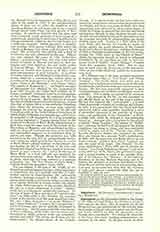

Improperia are the reproaches which in the liturgy of the Office of Good Friday the Savior is made to utter against the Jews, who, in requital for all the Divine favors and particularly for the delivery from the bondage of Egypt and safe conduct into the Promised Land, inflicted on Him the ignominies of the Passion and a cruel death. It is during the Adoration of the Cross that these touching remonstrances are rendered by the choir. In all they consist of three distinct parts. Of these the third—composed of the antiphon “Crucem tuam adoramus”, the first verse of Psalm lxvi, the versicle “Crux fidelis”, and the hymn “Pange lingua gloriosi lauream “—does not belong to the Improperia strictly so called. The first part consists of three reproaches, namely, the “Popule meus” (Mich., vi, 3), “Ego eduxi” (Jer., ii, 21) and “Quid ultra” (Is., v, 2, 4), the Trisagion (Sanctus Deus, Sanctus fortis, Sanctus immortalis) being repeated after each in the Latin and Greek languages. The second part contains nine reproaches pervaded by the same strain of remonstrance. Each of these is a verse taken from some portion of the Scriptures and followed in every instance by the “Popule meus” as a sort of refrain. Originally these striking sentences were rendered to a plainsong melody. In the year 1560 Palestrina gave them such an appropriate and beautiful musical setting that Pius IV ordered it to be used in the Sixtine Chapel, where one may still hear on Good Friday each year these exquisite compositions, which are unsurpassed in simple beauty, dramatic feeling, and depth of impressiveness. The best edition of Palestrina’s “Improperia” is probably that published by Dr. Proske in the fourth volume of “Musica Divina” in 1863. This version is founded on the Altaemps-Otthoboni MS. preserved in the Vatican Library (cf. Grove, “Dictionary of Music”, s.v.). The precise date of the appearance of the Improperia in the liturgy is not ascertained. Definite references to it are found in documents of the ninth and tenth centuries, and even traces exist in manuscripts of a much earlier date. In his work “De antique ecclesiae discipline”, Martene (c. xxiii) gives a number of fragmentary Ordines, some of which go back as far as 600. Many others mention the Improperia. In the beginning the order was not’ quite what it is now, and in many places the officiant himself at the Good Friday Office sang the verses of the reproaches, while the people joined m the responses or refrain. Thus the representative character of these moving words seems to have been more effectively observed.
P. J. MORRISROE


